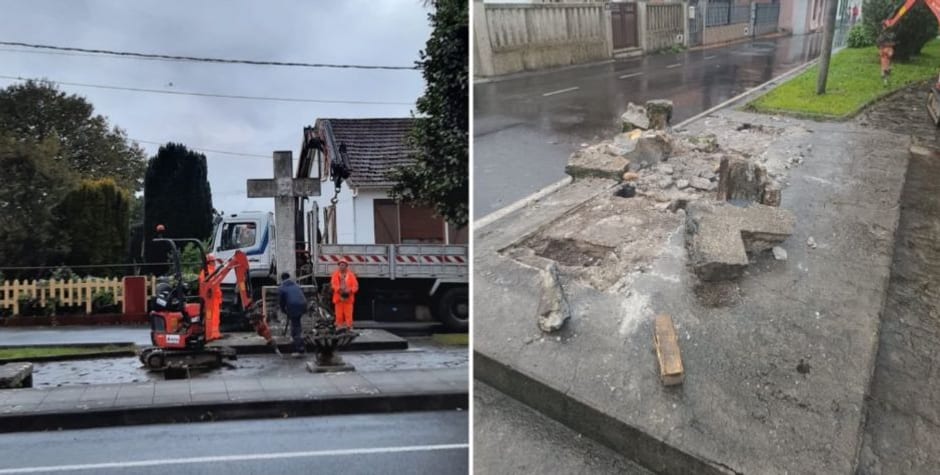

Spain: Euthanasia, Human Trafficking and Historical Revisionism
Spain: Euthanasia, Human Trafficking and Historical Revisionism
On the occasion of the United Nations Universal Periodic Review, a monitoring process to which Spain is subject, the ECLJ officially contributed to this review by denouncing Spain's infringements of certain issues relating to religious freedom and the defence of human life. Firstly, the legalisation of euthanasia, but also human trafficking, which is unfortunately a reality in Spain. Although Spain is still perceived as a country strongly rooted in its Catholic tradition - which remains partly true - the Spanish government is currently at the forefront of a ‘woke’ agenda to uproot the Catholic heritage while undermining its fundamental rights, in the name of an historical revisionism.
Illustration: X/Abogados Cristianosﻦ @AbogadosCrist
Historical revisionism against religious freedom
Since 2020, Spain has removed or destroyed numerous crosses in public spaces, mainly on the basis of the Historical Memory Act (2007) and, more recently, the Democratic Memory Act (2022)[1]. These laws are being misused as a cover for the destruction of religious symbols under the pretext of removing Franco's relics[2], when in most cases the cross has no political connotation and no purpose of exalting Franco's dictatorship.
Removing these crosses violates the right to religious freedom, a fundamental right enshrined in article 16.1 of the Spanish Constitution, which guarantees freedom of religion and worship, while respecting public order. The removal of religious symbols such as Calvaries is an infringement of this constitutional right because the religious symbol is removed precisely because of what it represents, thereby reducing the public expression of religious beliefs.
The increasing removal of crosses from public spaces illustrates a growing social tension and has sparked a lively debate in society about the limits of the law and the interpretation of historical and religious symbols. According to the latest count by the Spanish Association of Christian Lawyers in 2023, 31 crosses have been removed or destroyed in Spain, and a further 124 are under threat[3], again as part of the application of the Law on Democratic Memory. This figure is constantly rising, with an ongoing process of review and removal of symbols linked to the Civil War and Franco's regime.
The legalisation of euthanasia in 2021
The euthanasia law approved in 2021 legalised assisted suicide. However, the right to life is protected by Article 15 of the Spanish Constitution, and is therefore classified as a fundamental right, which means that it is distinct from other rights and should be afforded greater protection, which is clearly not the case with this new law. The text provides for two methods of euthanasia: the patient can choose to have the poison administered intravenously by a healthcare professional or take it themselves, either orally or by injection. The process involves the administration of several poisons that induce a coma and then death.
With the legalisation of euthanasia, 295 deaths were recorded in 2022, the first full year that the law was in force. In 2023, there were 727 requests for euthanasia, of which 323 have already been approved. This reflects similar trends seen in other countries such as Canada and the Netherlands, where euthanasia rates rose considerably after legalisation.
The law on euthanasia, as it stands, stipulates that individuals must be of legal age and suffering from a serious and incurable illness or a chronic disease that causes unbearable suffering. As we have seen in other countries, as people become accustomed to the practice of euthanasia in extreme cases, the interpretation of what constitutes ‘unbearable suffering’ broadens. This means that less serious situations are beginning to be included, and that this right is gradually being extended to people with less serious illnesses, and even to those suffering from psychological disorders.
Any society that claims to respect human rights must clearly express its opposition to the enactment of such a law, which so directly infringes the right to life. Spain has an obligation to protect all human life, not just those deemed to be in good health. Allowing euthanasia will only lead to the death of hundreds of people considered too ill to live. The status quo on the law authorising abortion that has been in force in Spain for years bears witness to a growing contempt for the right to life from its beginning to its end.
Human trafficking
Human trafficking in Spain is a subject that needs to be addressed very carefully, as the official data provided is serious. Specifically, between 2017 and 2022, 1,687 victims were identified. Sexual exploitation remains the predominant form of exploitation of the victims of human trafficking identified (around 60% of all victims). The majority of these victims were women (around 90%). At the same time, there has been an increase in the number of people identified as victims of trafficking for labour exploitation, the majority of whom are men.
Although it is important to point out that the Spanish authorities have carried out successful police operations. A crucial aspect of the new anti-trafficking law is the creation of a National Referral Mechanism, which is essential for protecting victims of human trafficking, as it establishes formal procedures for identifying victims of trafficking, even in cases where there is insufficient evidence to bring criminal proceedings.
Spain needs to tackle this issue head on, because in addition to providing essential help to victims, human trafficking poses a problem for the other countries of the European Union. Criminal networks use Spain as a gateway to access other Member States and expand. And the victims are multiplied.
_________
[1] Ley 20/2022, de 19 de octubre, de Memoría Democrática.
[2] Crux, ‘Spanish lawyers act to prevent the removal of crosses by local officials’, 13 February 2021.
[3] Actuall, ‘ Memoria histórica : al menos 18 cruces derribadas y otras 28 en peligro ’, 6 May 2021.
See the Map of the Crosses of Spain published on 29 June 2023.









